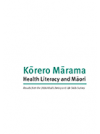The report describes the health literacy skills of Māori compared to non-Māori. Data in the report are sourced from the 2006 Adult Literacy and Lifeskills Survey (ALL) that New Zealand participates in along with other OECD countries. Health literacy is defined as the ability to obtain, process, and understand basic health information and services in order to make informed and appropriate health decisions.
The report found that Māori have poorer health literacy skills compared to non-Māori across all of the measured variables. Eighty per cent of Māori males and 75 per cent of Māori females were found to have poor health literacy skills. On average, New Zealanders have poor health literacy skills. The report presents findings by gender, rural and urban location, age, level of education, labour force status, and household income.
Key Results
Ngā Kitenga Matua: Key Findings
On average, New Zealanders have poor health literacy skills, with both Māori and non-Māori males and females scoring on average less than 275, which is the minimum required score for individuals to meet the complex demands of everyday life and work in the emerging knowledge-based economy.
- Four out of five Māori males and three out of four Māori females have poor health literacy skills.
- Māori who live in a rural location have on average the poorest health literacy skills, closely followed by Māori who live in an urban location.
- Māori in the 50−65, 16−18 and 19−24 years age groups have the poorest health literacy compared to the rest of the population. This is particularly concerning because over half of the Māori population (53%) was less than 25 years of age at the 2006 census. Also, older age groups have high levels of health need and are generally high users of health services.
- Māori and non-Māori with a tertiary education are more likely to have good health literacy skills compared to those with lower levels of education, which is consistent with international evidence.
- Māori across all labourforce status types have poorer health literacy skills compared to non-Māori, but Māori who are unemployed or looking for work have the poorest health literacy skills of all groups.
- Māori across all income quintiles have poorer health literacy skills compared to non-Māori.

